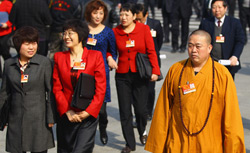![]()
 With my iPod headphones plugged in, the abbot of Shaolin keeps his expression perfectly neutral as his eardrums are assailed by the thumping beats of the Wu-Tang Clan.
With my iPod headphones plugged in, the abbot of Shaolin keeps his expression perfectly neutral as his eardrums are assailed by the thumping beats of the Wu-Tang Clan.
"I don't get it," says Shi Yongxin in his heavily accented Mandarin, after politely listening to the pioneering 1990s rappers from the New York borough of Staten Island who, in homage to kung fu movies of the 1970s, described themselves as coming "straight from the slums of Shaolin."
We're sitting in the restaurant of the Shaolin Temple, a UNESCO World Heritage Site nestled in a wooded valley in the shadow of Mount Song in China's central Henan province. This small monastery is the 1,500-year-old cradle of Zen Buddhism and the spiritual home of kung fu, where for centuries the temple's monks have practiced martial arts so they can uphold justice in society and cultivate their own search for enlightenment. Outside in the warm sunshine, tourists wander the temple grounds and watch incredible displays of strength and acrobatic kung fu, performed at regular intervals by the world-famous fighting monks.
It's hard to imagine a place less compatible with the violent tirades of one of hip-hop's greatest ensembles. But I'm trying to explain to his eminence that, even though he is unaware of the Wu-Tang Clan, many people who came of age in the West in the 1990s first heard about his temple from songs such as "Shaolin Worldwide," and lyrics such as:
The Jedi, only use the Force if ya force me
Shaolin What? Don't get it f**ked up and cross me
Rappers gettin' stuck for actin' stuck up and flossy
"People tell a lot of tall tales about the Shaolin Temple," the abbot says with the composed demeanor of the deeply religious. "They are not familiar with and don't represent the real history of Shaolin, the Shaolin culture, or the inherited essence of Shaolin."
If this sounds accurate in the case of RZA, Ghostface Killah, Ol' Dirty Bastard, and the rest of the Wu-Tang Clan, it is also a criticism that many in China have leveled against the abbot himself. The 46-year-old is a highly controversial figure. Since he became, in 1999, only the 30th monk in the temple's long history to be ordained a full abbot, he has faced relentless attacks for accepting expensive gifts and for commercializing the ancient temple. For those who denounce him through the Chinese Internet, the abbot's initiatives are a sad reflection of society's crude materialism in a country where, in the past few decades, the crumbling of communist ideology and the rush for wealth have left a spiritual and moral vacuum.
Buddhism is the dominant religion in China, with as many as 300 million believers across the country. Like other forms of Buddhism, Zen emphasizes letting go of worldly cares and working toward enlightenment through meditation and practice of the Buddha's teachings, which include a ban on harming any sentient beings. As its home, and the centerpiece of many kung fu novels and films, the Shaolin Temple has become an integral part of Chinese popular culture. In fact, it is probably one of the most famous global brands to have come out of China in any industry, thanks in no small part to the abbot, whom Chinese media have dubbed the "CEO monk."
The temple's business ventures include investments in its famous globe-trotting kung fu performance troupes, renting out the Shaolin name for films, cartoons, and stage productions, and an early stage investment in a possible line of traditional Chinese medicines. It has also sent monks to set up more than 40 Shaolin kung fu and meditation centers in countries across North America, Europe, and elsewhere, but the abbot says these and most of Shaolin's other "cultural activities" barely break even. Instead, he says, the vast majority of the temple's "few dozen million renminbi" in annual income comes from tickets sold to the roughly 2 million tourists that visit the site every year. The temple keeps 30 percent of the ticket revenues and hands 70 percent over to the local government.
The temple has registered its trademark across the world in an attempt to stop people from using its name to promote concepts that do not fit with its Buddhist precepts. But the main battleground is in China, where intellectual property protections are weak and companies making everything from soft drinks and chopsticks to electrical machinery and buses have appropriated the Shaolin brand. Even liquor producers and makers of pork sausages have taken the name, despite the fact that strict Zen Buddhism prohibits the consumption of meat and alcohol.
Jamil Anderlini is the FT's Beijing bureau chief.Photograph of Shi Yongxin by Feng Li/Getty Images.
Source: http://feeds.slate.com/click.phdo?i=c850e216f094988b6e1e99b0f866ea78
texas holdem poker sheep be master chef cag prostate cancer yo
No comments:
Post a Comment
Note: Only a member of this blog may post a comment.